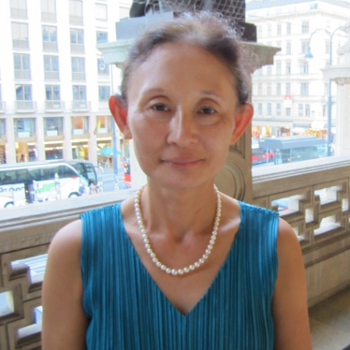Dmitri Tcherniakov’s new production of Der Freischütz strips any notion of “German Romantic opera” usually associated with the work. The action takes place in a stark modern corporate setting with walnut-colored curved wall panels that open to show floor to ceiling windows in the back. A dark screen above the stage introduces the main characters during the overture. Kuno is not a chief forester but head of a company where both Max and Kasper work with ambitions to advance and to wed Agathe, the boss’ daughter. A shooting competition is used as an initiation into the company's inner circle, with a diffident Max failing miserably as Kilian takes aim and shoots a random stranger. The killing is shown on the video screen above, but it turns out that this was a faked murder to intimidate Max, as the dead man later gets up and walks away. Kasper appears self-assured but hides a trauma which manifests as a split personality: he is both Kasper ad Samiel, the devil who appears in the Wolf’s Glen scene. There, he torments and tortures Max, who he brings in as a captive, bound and wrapped in plastic.
Agathe is an independent woman, intent on marrying Max, while her friend Ännchen, dressed in pale blue pantsuit and sporting cropped blond hair, teases her. In Tcherniakov’s production, nothing is as it seems on surface. There is an oblique reference to the two women’s not so platonic friendship. The “hermit” whose wisdom wins Max’s probation is one of the waiters who helps set up corporate functions where company men and women consume alcohol in excess. If this is not a mockery of those in power, what is? More denouement is yet to come. Max shoots Agathe, who falls dead in the overhead screen, but as was foretold earlier, this is a fake death. When the stage is lit, it is Kasper who lies dead. But as Max is given a reprieve and all join in a prayer of thanks by embracing one another, the stage is darkened, with a spotlight on Max, who appears delirious with joy. It is not clear when his delusions began, but as the lights come up on the corporate office for the last time, we realize that Max has imagined a lot, if not all, of the action. Agathe, in her white wedding gown, lies dead as Kasper, very much alive, stands with others.
So Tcherniakov took liberties by updating and divorcing the story of the opera from the world of hunters and peasants in the middle-ages in Bohemia, and even changed the ending. He succeeds in presenting an alternative and mostly coherent thriller in which violence and conflict are played out under the polished veneer of a modern corporation, the drama taking place in the course of 24 hours with the time of the day shown on screen at the beginning of each scene. The staging provides coherence to an opera which can often be a mere string of tuneful arias, duets and trios. It is a riveting production, as one never knows what surprise will happen next, as in this world the distinction between good and evil becomes ambiguous and nothing is to be taken for granted: a brilliant piece of theater.
Tcherniakov's production and the splendid vocal ensemble were supported and complemented by the superb Bavarian State Orchestra conducted by Antonello Manacorda, who brought out the forward looking complexities of Weber’s score. Each principal character is given a distinct backstory to make him/her interesting and sympathetic; this makes the singers’ performance all the more heartfelt and invested. Golda Schultz as Agathe had the most straightforward role of an independent woman eager to marry her love. She acted as a sincere and honest woman, bewildered and ultimately betrayed by her lover and sang Agathe’s arias with tenderness and earnestness, with rich and nuanced color in her gloriously expansive voice. Pavel Černoch as Max sang with a clear and brilliant voice, fearlessly and impressively scaling the heights of his arias. Anna Prohaska sang with stylish elegance Ännchen, as befitted her outfits. Christian Rieger as Kuno and Tareq Nazmi as the hermit contributed well in their brief scenes. The corporate setting obscured some of the minor characters, Kilian and Ottokar.
Bass-baritone Kyle Ketelsen gave the standout performance as Kasper/Samiel, alternating between the two with superb deftness, making the Wolf’s Glen scene even spookier than usual. Ketelsen is an agile stage presence, responding to the rigorous physical demands of the director, singing while dancing, drinking, and on the floor. His flexible and multilayered singing was a delight in his chilly aria “Schweig! damit dich Niemand warnt.”
This performance was reviewed from the Bayerische Staatsoper TV live video stream




